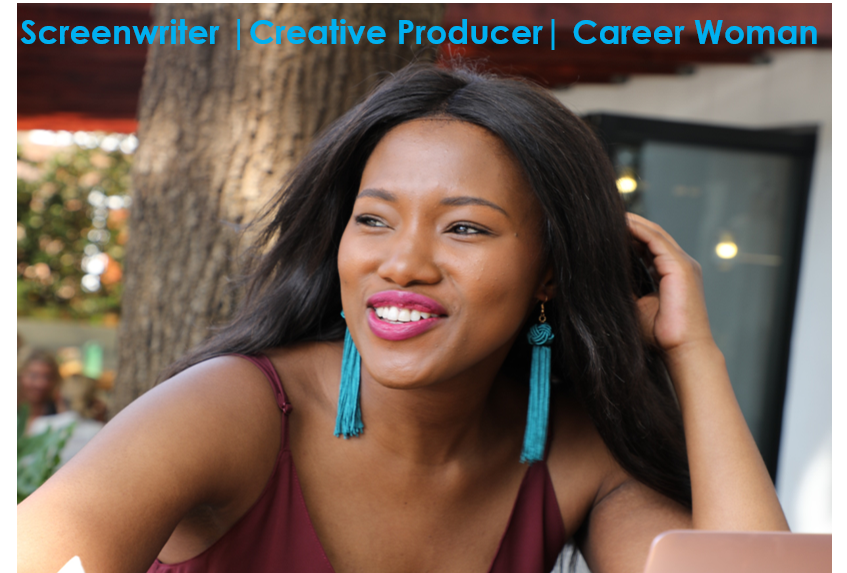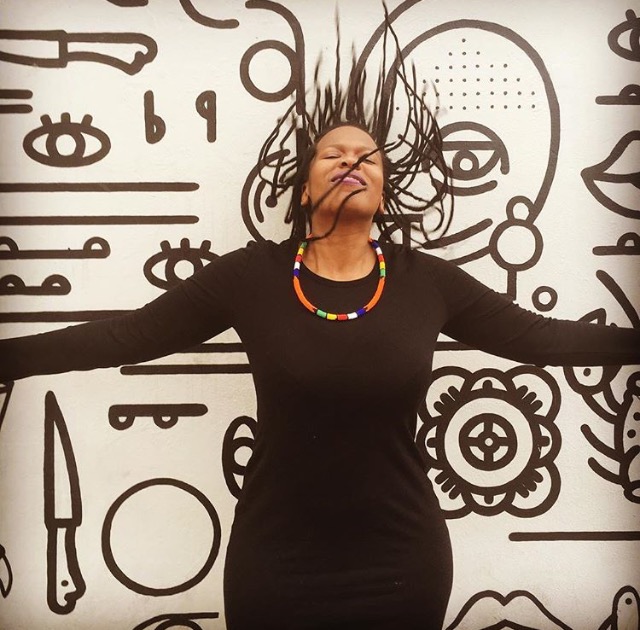If you have had any encounter with Sunni Faba, you’ll agree that her energy is so warm and friendly, one might feel like they’ve been friends with her forever. She’s poised and has a killer smile that is so infectious that you’ll stop and smile yourself. Sunni has been rising through the ranks (at warp speed) in the Film and TV industry and at just 28 years old, already has the accolades and experience that many would kill for. Her breakthrough moment was being a part of the writing team of Ayeye, a hit show following the lives of three young creatives in Jozi (one of my all-time favourites!) and now she is about to take on her biggest role yet – Head Writer for a new drama series.
This trailblazer has gone on to be a part of South Africa’s favourite productions such as Isibaya – where she was nominated for a SAFTA as part of the writing team for Best Achievement in Scriptwriting and Broken Vows which has been nominated this year for three SAFTA’s as a producer and a writer. She was even a scriptwriter for the 22nd South African Music Awards (SAMA’s). She’s unstoppable and has some exciting news to share with Mbewu Movement about her upcoming projects. I sat down with this cool lady over a coffee at her favourite caffeine spot in a Linden, Johannesburg to find out more.
LM: Tell us about yourself and your journey to success.
SF: My name is Sanelisiwe Faba, but they call me Sunni because I went to a model C school *Laughs*. It’s too late to change it now. I grew up in East London and then later moved to Johannesburg with my family, which was quite a culture shock, so I found it difficult to make the transition. I eventually settled in of course and it’s where I currently live.
For my tertiary education I initially studied at the University of Cape Town (UCT) to become a corporate lawyer. I became clinically depressed whilst there, which was attributed to many things, one of them being away from home and not following a purposeful path of my own. So, I moved back home to Johannesburg to regroup and try to find myself and what my purpose is (I know it sounds cliché). Whilst home, it was my mother who said to me, “You’ve always liked this film and drama stuff, so what can you do with that?”. From that I decided to enrol at Wits School of Arts and basically had to start from scratch.
“I always say that if the arts are your pull, you can never shut that up. It’s what you’re supposed to be and do and it will catch up with you if you oppress it.” – Sunni Faba
I studied Theatre at Wits, but knew I had to start working in TV and not just be a theatre purist because I thought to myself that the narrative of the ‘poor and struggling artist’ was old and done, so I got a job as an intern director for Lokshin Bioskop. That was a difficult two years because I was studying and working at the same time. I remember being interviewed and told, “You don’t have TV experience, why should we hire you?”. To which I would reply, “I know how to tell stories, I know how to direct and I know how to write. I can pick up the technical work as we go along. Give me the job, let me prove it to you.”
From there I took on more opportunities at eKasi Stories and Lokshin Bioskop as a freelancer and then I got the chance to be a part of the development team for Ayeye. That is the point where I felt my career had started, and that’s when accolades such as being one of Mail and Guardian’s Top 200 Young South Africans came about. This was validation that I was on the right path, for everyone – me and my family. All of this led to more opportunities such as writing and storylining for Isibaya and thereafter Broken Vows working as an Assistant Creative Producer and Writer.
LM: Tell us about the things that remain largest influences of your work.
SF: Black people. Black people’s stories told by black people are so underrepresented in everything! What’s great about television is that it really one of the key mediums for education in South Africa, so it has great responsibility and I feel privileged to be a part of that. I need to be one of those black people telling our story!
I also just want to make dope work. Work that I’m super proud of and that people love. I was getting a wax this one day and the lady was telling me about a film she had watched that I happened to have directed. I wanted to tell her but I didn’t, thinking she wouldn’t believe me anyway. So it lives beyond me, it’s bigger than me!
And my parents influence me a lot – they are super proud of me.

LM: What are the experiences of being a black woman in your industry?
SF: The industry is still very white and very male. As a black woman, like in many other industries you always have to prove yourself and people are always waiting for you to under-deliver. Generally black women are there to provide great stories but we don’t ‘own’ anything, we don’t run the shows and we’re not the executive producers on the shows. So we’re harvested for the goods, but just for a salary.
If you look at the credits after a South African show or film, in the key roles you’ll find:
First place is white male.
Second place is white women.
Black people later… for the grunt work and providing the ‘black
experience’
Also, many writing rooms are still so white. They say we don’t have enough good black experienced writers, but television has only been made by white people for decades – so where is this experience supposed to come from? We need to correct the practise that stories are taken from black people, but white people write them and get the accolades. How am I supposed to be a ‘good, experienced writer’ when you’ve taken my stories and not given me the chance to write and produce them myself? Currently, the way shows are created in this country is through affiliation with a big typically white owned production company. So the whole model needs to change. We need to start to take chances on the little guys – stop having me around to just be the black voice in the room. My value extends past that. There is a lot happening, but very slowly. It’s frustrating because what we as young black creatives are doing is amazing and important.
LM: Why do you like storytelling?
SF: When I write I get to understand my own thoughts clearer. I get to tell stories and live all these amazing different lives. I get to understand other people and it kind of makes you an expert on many things. If I wasn’t able to write, I would go crazy!
I love going home to the Eastern Cape because my life in Joburg is different to a young woman my age who lives there. So her story needs to be told as well.
Stories are universal.

LM: Who is your role model?
SF: My Mom *smiles*. I genuinely believe that if she was born in this time, she would be doing what I’m doing now – even better. She always told us ‘iintsomi’ growing up. She has a knack for it. She is a teacher, my teacher. She’s an amazing storyteller and where I get my story brain from.
LM: What’s next for Sunni Faba and how do we keep up with you?
SF: I’m excited to share with you that I will be Head Writer for a 13-part medical drama for SABC this year! I have put together a kickass team consisting mainly of young, smart and talented black female writers. I believe in the team so much and can’t wait to share our work with the world. Stay tuned *smiles*.
Other than that I appreciate the support even just by retweeting something or watching something – I need the ratings! I just want to create, produce and own. From the ‘land’ to the TV, we need to own this stuff.
I also just want to make work that I see myself in, that I see my friends in. No one has ever done it the way we are doing it now. We are so interesting. We should never forget that.
All social media is @sunnifaba

Interview conducted by Lilitha Mahlati, an investment banker and founding member of Mbewu Movement. She describes herself as a gender and transformation activist who enjoys learning new languages and travelling the globe.




